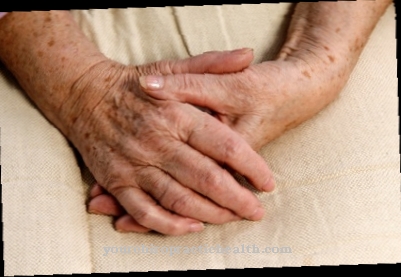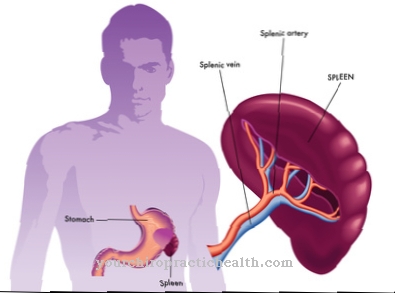A Urinary retention can be painful and have a variety of causes. A first step in combating this is a sufficient diagnosis of the cause.
What is urinary retention?

In medicine, urinary retention (also known as ischuria) is when the urinary bladder of an affected person is filled and he also feels an urge to urinate, but is unable to urinate. Urinary retention is one of the so-called bladder emptying disorders.
Depending on the person affected, urinary retention can lead to severe pain and / or a feeling of pressure in the bladder area. Both are caused, among other things, by the overstretching of the bladder wall during urinary retention.
If urinary retention persists for a longer period of time, the function of the bladder sphincter can be impaired; Such a functional impairment can be seen, for example, in a dribble of urine, which cannot be deliberately influenced.
causes
Urinary retention can have various causes. For example, acute (short-term) urinary retention in men is often caused by a benign enlargement of the prostate (prostate gland). Such an enlargement of the prostate can lead to a narrowing of the urethra and thus to urinary retention.
Other possible reasons for urinary retention due to a narrowed urethra include herniated discs, bladder stones or injuries to the urethra. So-called spinal anesthesia (anesthesia or anesthesia placed in the spinal cord) during operations can lead to urinary retention in the patient for several hours.
Urinary retention due to medication is also possible; For example, drugs that are used to treat incontinence can provoke urinary retention. The same applies to other drugs, such as certain antidepressants. Last but not least, there may be short-term urinary retention due to psychological factors; for example due to situational time pressure or on excursions.
You can find your medication here
➔ Medicines for bladder and urinary tract healthDiseases with this symptom
- Prostate enlargement
- disc prolapse
- Bladder stones
- Paruresis
- Urinary stones
- Urethral stricture
- Bladder cancer
- Paraplegia
- Uterus subsidence
- Polyneuropathy
- Spina bifida
- multiple sclerosis
Diagnosis & course
Can be diagnosed a Urinary retention already often based on the patient's complaint. To determine the causes behind urinary retention, one of the possible procedures is a urine test, for example.
This examination can provide information about possible pathogens that underlie urinary retention. Other test methods that can be used to determine the cause of urinary retention include blood tests or swabs. Occasionally, urinary retention may require further procedures such as ultrasound or MRI (magnetic resonance imaging) examinations.
The course of urinary retention depends heavily on the causal factors. If the causes can be remedied medically relatively quickly or if they subside on their own, then urinary retention often also decreases. If urinary retention has long-term causes, it can lead to a chronic course of the complaint without necessary measures.
Complications
Urinary retention can lead to a number of complications. In the case of a chronic disease, the urinary tract will expand over time and thus adapt to the increased pressure, which also puts excessive strain on the kidneys. This can lead to a so-called water kidney (hydronephrosis): the kidney dilates, scars and finally shrinks (shrink kidney). There are also infections of the urinary tract, caused by the pent-up urine, which facilitates the spread of pathogens in the body.
One possible consequence is urosepsis, i.e. an acute infection of the urogenital tract, which further weakens the kidneys as the disease progresses. Kidney function continues to decline and irreversible damage occurs, such as chronic kidney failure, often accompanied by high blood pressure, edema all over the body (dropsy) and confusion. Urinary retention in children can lead to the need for dialysis. A donor kidney is often the only way to regenerate the urinary tract.
Other complications can occur depending on the severity of the urinary retention. There is almost always severe pain in the urinary tract and especially in the kidneys, often in combination with bacterial diseases, the formation of abscesses and, in severe cases, tumors in the kidney and urogenital area. Finally, urinary retention promotes various organ diseases. In addition to the kidneys, the heart, liver and gastrointestinal tract are also excessively stressed.
When should you go to Art?
Urinary retention is a bladder voiding disorder that requires immediate medical treatment. Anyway, those affected by urinary retention will try to see a doctor as soon as possible. If you are unable to empty your bladder, which is obviously full, with a corresponding need to urinate, or only very slowly, and if you are in severe pain, this is extremely worrying and quickly leads to high levels of suffering. There are many reasons for urinary retention.
A classic cause of urinary retention in men is benign prostate enlargement, in which urethral constriction leads to urinary retention. In both sexes, urinary retention can also occur from bladder stones, urethral injuries, herniated discs, uterine subsidence and bladder cancer, as well as certain medications. Impaired emptying of the bladder in diabetes mellitus and multiple sclerosis should also be considered. In addition, urinary retention can be psychological.
Acute urinary retention, in which no urine can be passed at all, is considered a medical emergency. The urinary bladder must be emptied immediately via a catheter to prevent the urinary bladder from rupturing. Thereafter, the underlying disease is treated. Chronic urinary retention, which is not always painful, should also be treated by a doctor, as it damages the kidneys in the long term. In addition, the pressure of an always overfilled bladder weakens the sphincter and there is a risk of incontinence.
Doctors & therapists in your area
Treatment & Therapy
In order to be able to successfully treat medically relevant urinary retention, a thorough diagnosis of the cause is first necessary. The individual therapy for urinary retention is then designed according to the identified causes.
In order to initially relieve the acute pressure on the bladder wall and possible pain caused by urinary retention, symptomatic intervention is often the emptying of the urinary bladder with the help of a urethral catheter. Such a catheter is inserted into the urethra in the event of urinary retention and allows the urine that has accumulated in the bladder to drain away. The length of time for which a urinary catheter remains in the urethra of the individual patient depends on the cause hidden behind urinary retention.
Treatment of the cause of urinary retention can now follow: if the urinary retention is bacterial, for example, antibiotics can be given to combat the underlying infection.
If urinary retention can be traced back to bladder stones in the affected person, the corresponding bladder stones are usually removed; This is possible, for example, through minor surgical interventions. If, for example, urinary retention is caused by malignant or neurological diseases, an important aspect is the treatment of the relevant underlying disease.
Outlook & forecast
The prognosis depends on the underlying disease. If urinary retention is detected and treated in good time, there are usually no complications. When the overfilled bladder is emptied in a controlled manner through a urethral catheter, the bladder may in rare cases be injured.
If left untreated, urinary retention can become chronic. Acute urinary retention threatens to rupture the bladder. A urinary stasis kidney is also possible. In the course of urinary retention, incontinence can occur, as the congested urine fluid increases the pressure in the bladder until overflow incontinence occurs.
Men are more likely to suffer from acute urinary retention than women. In order to enable a comprehensive diagnosis and healing prognosis, female patients are subjected to a different clinical examination than male patients, as there are different anatomical requirements. Gender-specific underlying diseases such as enlarged prostate in men and cervical cancer in women can also be the cause.
The course of the disease is protracted if a herniated disc or multiple sclerosis are the trigger for urinary retention, since these underlying diseases are themselves associated with various complications.
In most cases, urinary retention is due to bladder stones, a bladder infection, urethritis, urinary tract infection, or stress. The prognosis for these underlying diseases is positive, because these complaints can be treated promptly and specifically with medication within a period of two to three weeks.
You can find your medication here
➔ Medicines for bladder and urinary tract healthprevention
The possibility of preventing urinary retention depends on its causes. Bacterial urinary retention can be prevented, for example, by taking adequate hygienic measures in the intimate area. If there are indications of a possible physical illness that can lead to urinary retention, other preventive measures are an early visit to the doctor and an early (if necessary) start of treatment.
You can do that yourself
In the event of acute urinary retention, in which the bladder constantly fills with urine, but the person concerned can no longer deliberately empty it, a doctor must be consulted immediately. With self-treatment there is a risk of a bladder tear. If there is a drainage congestion due to bladder stones, this problem must also not be treated by the patient himself. However, the person affected can do a lot to ensure that bladder stones do not form again.
Patients prone to bladder stones should drink at least two liters of fluids a day, preferably water or unsweetened herbal or fruit tea. In naturopathy, patients are also advised to use a number of home remedies. It should help to pour hot water over a fresh couch grass and let it steep for ten minutes. The brew is drunk in small sips after cooling. The regular consumption of horseradish, corn tea and calcium-containing foods, which are supposed to bind the stone-forming oxalate in the intestine, are also considered helpful.
If the urinary retention is due to an acute inflammation of the lower urinary tract, there are also some home remedies that can help improve it. With a bladder infection, a hot water bottle on the lower abdomen often helps. The patient can also help the inflammation to heal as quickly as possible by wearing warm underwear and avoiding cold seats.




.jpg)



















.jpg)



